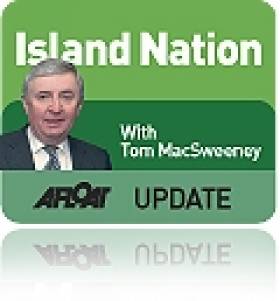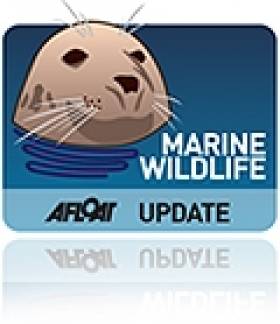Displaying items by tag: Roaringwater Bay
Encouraging Young Sailors Into Keelboats & A 'Cool' Ship In The North Sea
#islandnation – Heir Island, which is mistakenly called 'Hare Island' and in Irish is known as 'Inishodriscol' is one of "Carbery's Hundred Isles," that are "scattered," as some descriptions put it, throughout Roaringwater Bay on the West Cork coastline. It is two-and-a-half kilometres long, with spectacular flora and fauna.
Historically the island formed part of the O'Driscoll clan territory and was known as Inis Ui Drisceoil or Inis an Oidhre. The English version of the name has been traditionally misspelt as "Hare" ---- since 1694 at least, so the islanders claim.
It is also the location of Heir Island Sailing School, a Training Centre approved by the Irish Sailing Association and which for the past two weeks has been training future keelboat sailors amongst a coterie of interested youngsters.
Encouraging young people into sailing is very important for the future of the sport so it is good to hear positive reports about the innovation introduced on Heir Island in to teach young sailors the skills of keelboat racing.
"We can't take credit for the natural environment," John Moore who, with Patricia, runs Heir Island Sailing School, told me. "But what we can do is develop an interest in sailing as an active, enjoyable for sport for everyone and widen the interest of young people in aspects of the sport."
With residential accommodation available at the centre the Irish Cruiser Racing Association which has overseen the running of racing for keelboats, chose it as the base for a new initiative "Keel Boat Race Week." ICRA has the job of bringing together the various aspects of Irish handicap racing. Since its inaugural meeting in 2003 when sailors, primarily from Cork and Dublin, met in Waterford to establish the Association it has built a solid core of interest among cruiser racing enthusiasts. It has also led the successful Irish winning of the top UK international trophy, the Commodore's Cup.
With Heir Island Sailing School the initiative, open to all junior sailors in the country was launched, aimed at Transition Year students in particular, to run two week-long courses for young sailors keen to broaden their sailing and racing experience. The school year schedule for 'Transition' provided the way to do this and those committed to the future of the sport took the opportunity.
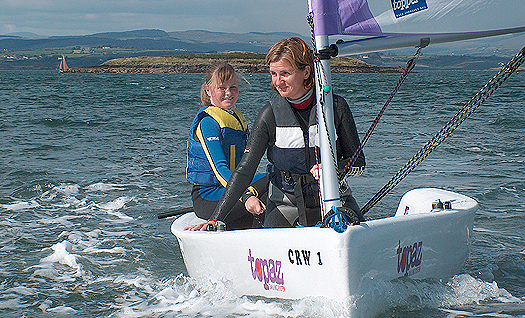
Twenty-five young sailors took part in the first of the two weeks and sixteen were involved on the second week, all keen to broaden their sailing and racing experience. A team of expert coaches, using six, matched, open keelboats taught them to develop skills associated with racing keelboats including handling the mainsail, headsail trim, bow work, helming, tactics and spinnaker handling. Ben Fusco, Head Coach at the Royal St George Yacht Club in Dun Laoghaire, a student yachting world champion, was chosen by ICRA to be involved in this project as well as Ben Lynch, an offshore sailor, who has raced aboard Volvo Open 70s and competed in some of the world's most challenging offshore races.
"At the end of the course they have gained familiarity with the various roles on keel boats as well as an appreciation of the tactics and strategy used throughout keel boat races," John said. The youth sailors came from areas around the coast. "They have also learned how to adapt the dinghy approach, in the boats they would have been sailing up to now, to bigger, more powerful boats".
There is a near-permanent difficulty in getting and keeping crews for cruiser racers, as I know from personal experience, so building up a reservoir of future sailors is important for the sport. One of the biggest problems has been the loss of young sailors after they leave dinghies. Many of them do not to remain in the sport.
Encouraging them to do so and developing the youth interest is important. In this regard Whitesail racing has provided an opportunity for families to race together. At the Friday evening racing in the RCYC in Crosshaven we adopted a youth policy aboard my own boat, a 33ft. Sigma and put our youngest crew member on the helm, a 10-year-old sailor from the Optimist bronze fleet. The training young sailors get in those little boats is impressive.
Conditions were mostly light enough during the three-race series for Oisin, my grandson, to helm our boat with tactical advice from the senior members of the crew. We won the series with a 1st and 2nd in a tie-breaker with the next boat, Micheál Lynch's, Lady T, both finishing on 9 points. Micheál deserves a lot of praise for his commitment to whitesail which has encouraged more people to take their boats out racing and enjoy the experience. It was good to see the way in which the RCYC sailors encouraged our young helm. The future of sailing will depend heavily on those who race for enjoyment. Without them, the highest competitive level of the sport will not have a foundation upon which to develop.
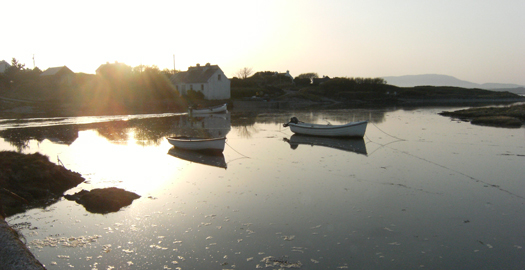
Heir Island
So let's give more encouragement to the youngsters. They will take over eventually, one way or the other (!) But helping them along will benefit the sport – and perhaps more boats and owners! When Oisin took over on the helm I went to where I have been on other boats - sitting on the rail. There is a different perspective there. It didn't lessen my overall concerns, because being owner I still have to sign the cheques when equipment and replacements are needed (!) but I did take a lot of satisfaction from seeing a youngster from the Optimist fleet handle the helm of a 33ft. cruiser effectively and I did learn – that we can all be replaced !
'COOLEST' SHIP IN THE NORTH SEA
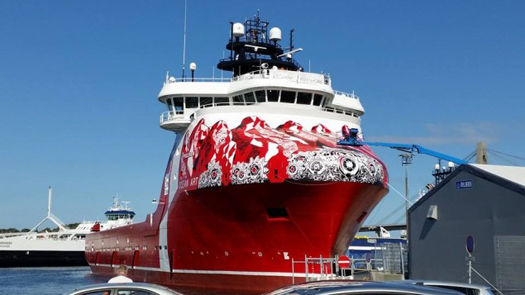
There are not too many ships as brightly painted as the one pictured here, the new vessel launched for the Norwegian offshore supply shipping company Atlantic Offshore, Ocean Art PSV, in Stavanger. It was built at the Kleven shipyard in Myklebust, Norway and named during the ONS offshore energy conference in Stavanger, which coincided with the Nuart street art festival. A Polish street artist, Mariusz "M-City" Waras, painted the ship. It is the second of two VS 485 MKIII L designs ordered by Atlantic Offshore from Kleven and is to go on a six-year contract with Statoil in the North Sea. They claim it is the "coolest looking" ship in the North Sea! It certainly won't be un-noticed.
THE NAVY CALLS BACK!
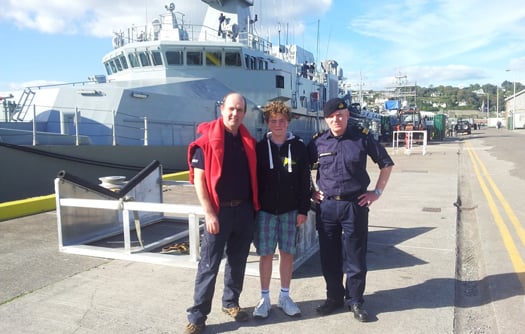
John Hegarty, skipper of odd job at MBSC, his son Morgan and Lt. Cdr. Tony Geraghty, Commander of LE Samuel Beckett at the Naval base
I described, back in July in this blog how I was crewing aboard a yacht out of Monkstown Bay in Cork Harbour in that club's Thursday night cruiser league when the VHF came alive with the first radio call I had heard from the new Naval vessel, 'SAMUEL BECKETT' which had come up astern of us, returning from sea patrol. The Naval voice courteously requested if 'ODD JOB,' the yacht on which I was crewing, would alter course in the 'narrows' as the water area off Cobh and between Haulbowline Island is called by sailors, so that the State warship could make her approach to the Naval Base. Our Skipper, John Hegarty, acknowledged with equal courtesy and called a tack so 'ODD JOB' came about to go astern of 'L.E SAMUEL BECKETT' which then went into her berth at the Base. We brought 'ODD JOB' about again and returned to the racing fray, but the alteration cost us first place on handicap by two minutes and forty seconds. However, this incident showed the value of courtesy and good seamanship. The Navy showed equal courtesy in making contact after they read the story here on the Afloat website. We were invited to visit the ship and were shown over it by her commander, Lt.Cdr.Tony Geraghty. She is an impressive vessel. I recorded an interview with Lt.Cdr. Geraghty which will be transmitted on my THIS ISLAND NATION radio programme and which you can hear next week here on afloat.ie
130 YEARS OF DUBLIN SAILING
As a Southern sailor, I have to admire the sight of all the sails in Dublin Bay out of Dun Laoghaire which I have seen over the past two Saturdays when my journeys took me along the seafront. It was very impressive, a great panorama of the sport and an indication of just how big the marine leisure sector is and its potential importance to the national economy. Congratulations to Dublin Bay Sailing Club which celebrated its 130th Anniversary at the weekend. The club has made a great contribution to the development of sailing since it was founded in 1884 and has co-ordinated racing in and out of Dun Laoghaire harbour. It has also influenced the development of yacht design through classes such as the Dublin Bay 25s, the Dublin Bay 21s, the Dublin Bay Mermaids and the Dublin Bay 24s. When marine correspondent with RTE I saw the efficiency of the DBSC in running sailing events. Long may it continue.
GETTING RID OF A SPY SHIP
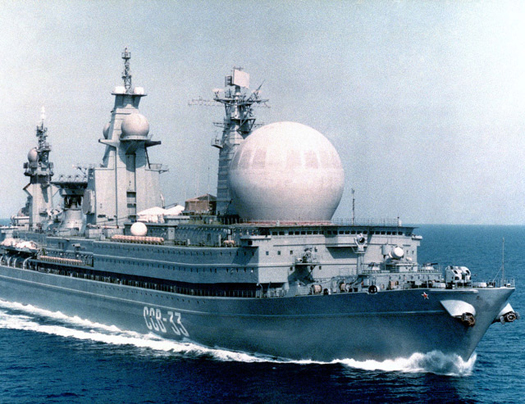
November 5 should be an interesting day on the web. Rosatom which is a Russian State Corporation, will be holding an auction for bids to demolish the warship, SSV-33 Ural, that was launched in 1983. Nuclear-powered, it was regarded as a "spy" ship but hadn't a successful career. After less than two years in operation, there was a fire aboard and, with the fall of the USSR, there wasn't enough money for repairs, so she was taken out of service. The ship must be disposed of within the Bay of Bolshoy Kamen in the Primorsky region by November 30, 2017. Nuclear fuel was unloaded from the ship's reactor and removed for recycling in 2009. Parts of the ship are to be used to repair other nuclear-powered Russian naval vessels.
THIS ISLAND NATION EXPANDING
From next week my THIS ISLAND NATION radio programme is moving from monthly to fortnightly transmission. It will be broadcast here on the afloat website, so I hope you will tune in.
Until next week, the usual wish of .....
"fair sailing..."
Email: [email protected]
Twitter: @Tom MacSweeney
Baltimore Whale Remains Dumped At Sea
#MARINE WILDLIFE - The carcass of the fin whale that died after being trapped in Baltimore Harbour two months ago has been towed out to sea after its presence in a conservation area attracted complaints.
According to the Irish Examiner, disappointment has been expressed by a local group in Baltimore who hoped to salvage the skeleton of the 65ft female fin whale, the remains of which have now been towed out beyond Fastnet Rock for disposal.
Last week Afloat.ie reported on claims from local resident Tom McCarthy, among others from the Schull area, that the whale carcass was creating a "rancid oil slick" with a "horrendous smell" in Roaringwater Bay, a Special Area of Conservation for marine wildlife that houses a grey seal breeding ground.
However, the Irish Whale and Dolphin Group (IWDG) - which was working with Baltimore residents on their plan to retrieve the bones with a view to displaying the skeleton in the town - criticised the decision by Cork County Council to dump the remains.
IWDG sightings co-ordinator Pádraig Whooley pointed the finger at "vested interests" exaggerating claims about health hazards, arguing that "towing it out to sea raises the very real possibility that [it] could simply wash up on the coast again."
The Irish Examiner has more on the story HERE.



























